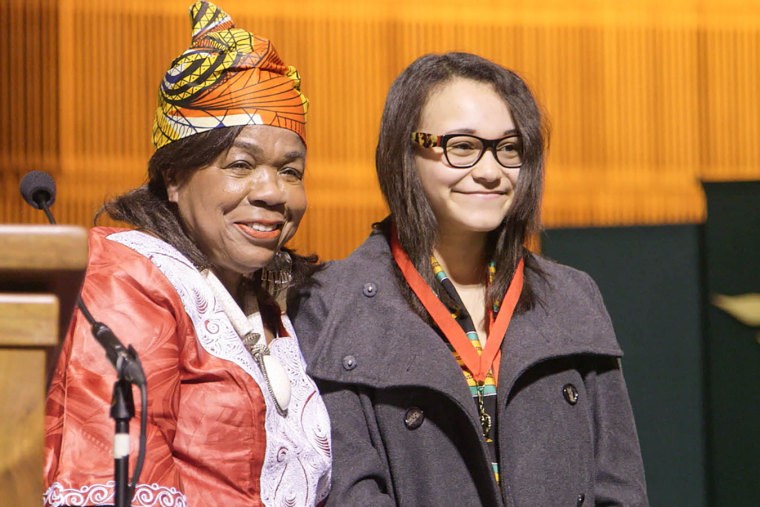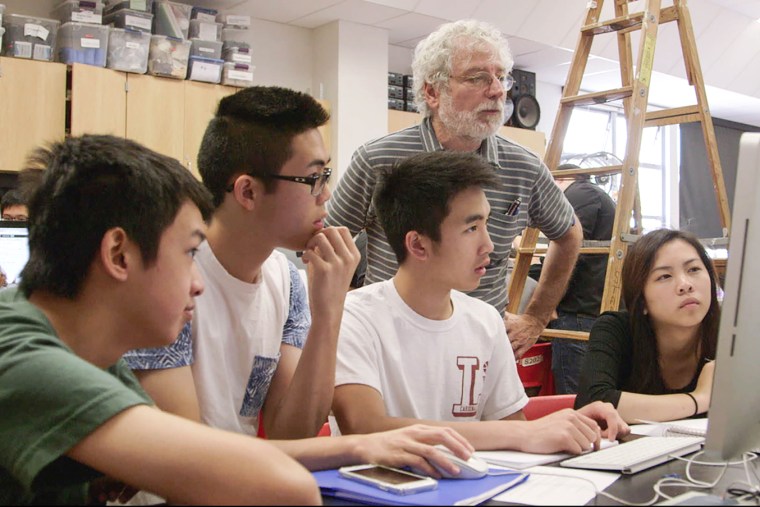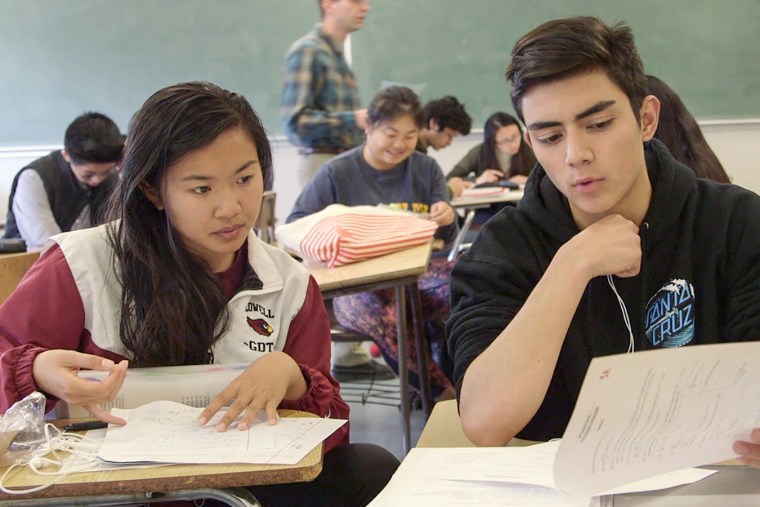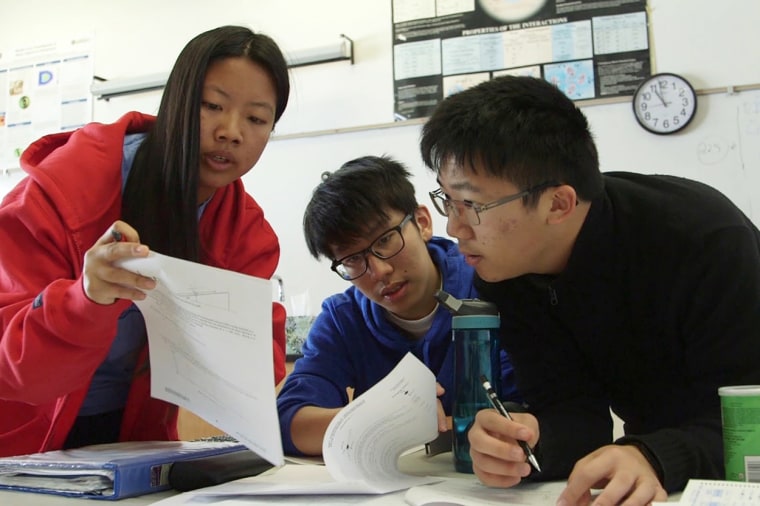In a documentary on San Francisco’s rigorous Lowell High School, an Asian American student chastises his mother for saying that his father never finished high school.
“Don’t say that,” then-senior Alvan Cai says in Mandarin to his mother, Capri, off-camera before speaking to the filmmakers. “I don’t want people to think lowly of my dad or anything.”
While Asian Americans who strive for top-tier colleges are stereotyped as being from wealthy, educated families, the reality more often resembles stories like Cai’s: children of working-class immigrants who grab onto the idea of higher education as a vehicle for stability in the U.S.
It’s these students whom director Debbie Lum said she hoped to humanize in her documentary, “Try Harder!,” which made its broadcast debut Monday on PBS’s Independent Lens.
“These are the kids who can’t afford to go to private school. Families bank on that,” Lum told NBC Asian America. “It is a way for someone who didn’t have access to have a way up in society.”

The documentary, which premiered at Sundance last year, chronicles the lives of five students during the 2016-17 school year as they embark on a grueling college admissions process.
For seniors across the country, the admissions journey may color a portion of their high school experience. But for those at Lowell, the city’s top public school, the documentary shows how the process almost single-handedly defines students’ coming-of-age, thrusting them into the ebbs and flows of anticipation and heartbreak.
The students are seen shouldering the burden of extracurriculars ranging from student government to science competitions to sports, along with multiple advanced placement classes, and work. On top of it all, many say they are in constant negotiation between their own dreams and those of their parents. Lum said that with its demanding environment, Lowell is often described as “elite.” But the term comes with socioeconomic baggage that doesn’t quite accurately reflect Lowell students.
“For the most part, and historically speaking, it’s the kids who are coming from Chinatown, taking an hour bus ride to get there,” Lum said. “Maybe they’re living in Chinatown SRO [single-room occupancy] housing.”

According to the most recent Lowell High School Accountability Report Card, released by the San Francisco Unified School District, the student population is overwhelmingly made up of people of color, with Asian Americans constituting more than 50 percent. More than a third of the student body is considered “socioeconomically disadvantaged.” And over a quarter qualify for free lunch.
Lum said it was evident that many of the parents, who're mostly Asian immigrants, played no small part in their children’s education, prodding them toward certain endeavors and carting them around to after-school activities.
But much of their involvement, Lum said, appeared to be driven by a belief in the American Dream and a trust in meritocracy. The mentality isn’t specific to Lowell, either, but one that’s often misinterpreted and labeled as a symptom of overbearing “tiger parenting.”
Pawan Dhingra, a sociologist and a professor of American studies at Amherst College, previously explained that the yearning to attend elite schools is rooted in the belief that education is the only way for Asian American children to compete with others, particularly whites. The majority of Asian Americans come from immigrant families and do not have existing social connections to help secure jobs or internships.
Lum said these family values spawn a unique culture among students, who are bound by a shared understanding that their commitment alone could potentially lift them, and their families, up into better circumstances.
“There is the sort of community where they’re all in it together and nobody has a special pass,” Lum said. “There aren’t students who, their parents are sitting on the board of something or other.”

The director said that this environment resulted in a social hierarchy that highly values academic achievement and talent, elements core to admissions. Social life, unlike many other schools, does not orbit around the jocks. Jonathan Chu, for example, is seen as a “Lowell God.” in the film. He excels in his AP classes, masters the violin and several sports, and serves as student body president.
Lum said she learned in filming that Chu was also an exceptional piano player and rumored to ice skate as well. Those in the film almost lionize him, speaking about Chu as if he were a mythical icon, for whom they have great admiration. And of course, he’s been accepted to Harvard.
The emphasis on excellence is so pervasive in their social circles, Lum said, that one student, Ian Wang, applied more pressure on himself despite active encouragement from his parents, who are Lowell alums, to take a less intensive course load.
“Ian used to get so much flak, because he only took two AP classes in his junior year,” Lum recalls. “We had already seen the kids giving him a really hard time about what his mom felt really bad about … she was like, ‘I don’t want you to kill yourself.’”
As admission to elite schools occupy the center of life at Lowell, affirmative action remains a topic that lurks under the surface. In one scene, a physics teacher warns students that they may not get into their dream Ivy League school, even if they’ve earned a spot, because his powerpoint slide reads, “You’re Asian!” And in others, Rachel Schmidt, a Black student, reveals some of the assumptions and casual racism directed at her because of her race.
“Throughout my time at Lowell, I’ve internalized that stereotype that I get a lot of things because I’m Black. And I think for a while, I’ve tried to not own up to my blackness,” she admits. “I think I’ve worked hard and I think I have the right grades.”
Lum said that the perception that the cards are stacked against Asian students looms large. Even Schmidt told the filmmakers that she doesn’t believe it’s fair that her Asian peers aren’t getting into school, just because of their race. Even so, Lum said that a majority of the Asian students continue to support affirmative action.
“Our community has been pitted against other minority communities in this weird way, which isn’t real,” Lum said. “Most of the kids that I talked to were in support of affirmative action. Even if they thought, ‘Yeah, that might mean it makes it harder for me. but for people who have experienced systemic oppression, There should be some righting of the wrongs.’”
